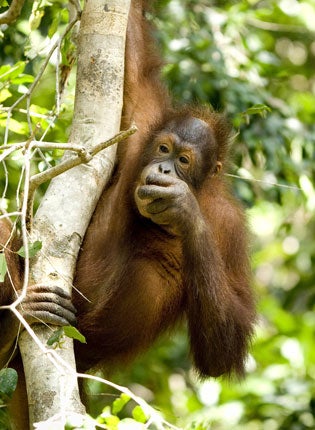Orang-utan language identified

Your support helps us to tell the story
From reproductive rights to climate change to Big Tech, The Independent is on the ground when the story is developing. Whether it's investigating the financials of Elon Musk's pro-Trump PAC or producing our latest documentary, 'The A Word', which shines a light on the American women fighting for reproductive rights, we know how important it is to parse out the facts from the messaging.
At such a critical moment in US history, we need reporters on the ground. Your donation allows us to keep sending journalists to speak to both sides of the story.
The Independent is trusted by Americans across the entire political spectrum. And unlike many other quality news outlets, we choose not to lock Americans out of our reporting and analysis with paywalls. We believe quality journalism should be available to everyone, paid for by those who can afford it.
Your support makes all the difference.Orang-utans communicate intelligently using gestures, researchers have found.
British scientists who spent nine months observing the great apes in three European zoos identified 40 frequently used body language signals. These were employed repeatedly to send messages such as "I want to play", "give it to me", "go away", "follow me", or "stop doing that".
"Play" gestures involved a range of clowning antics, including back rolls, placing objects on the head, and blowing raspberries.
"Nudge and shoo" movements meant an ape wanted to be left alone, while a hand to mouth "begging" gesture requested food.
Other gestures included hitting the ground, hair pulling, biting the air and grabbing.
This was the first study of great ape body language to focus on the intentional meanings of specific gestures. Two scientists from the University of St Andrews observed 28 orang-utans at Twycross Zoo in the UK, Apenheul Primate Park in the Netherlands, and the Durrell trust in Jersey. Their study is reported in the journal Animal Cognition.
Join our commenting forum
Join thought-provoking conversations, follow other Independent readers and see their replies
Comments